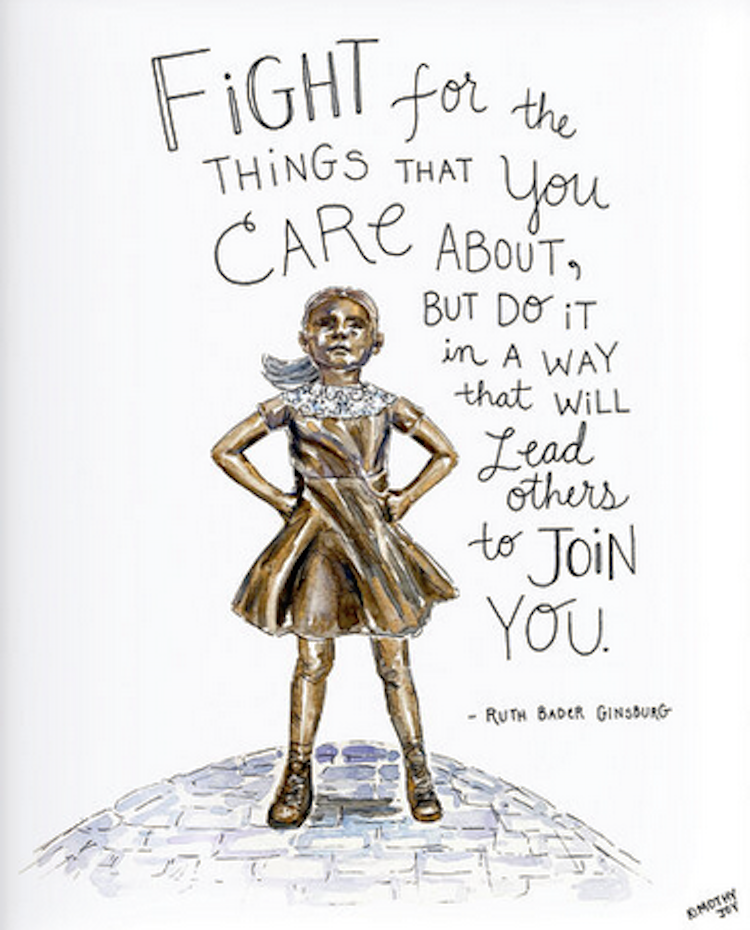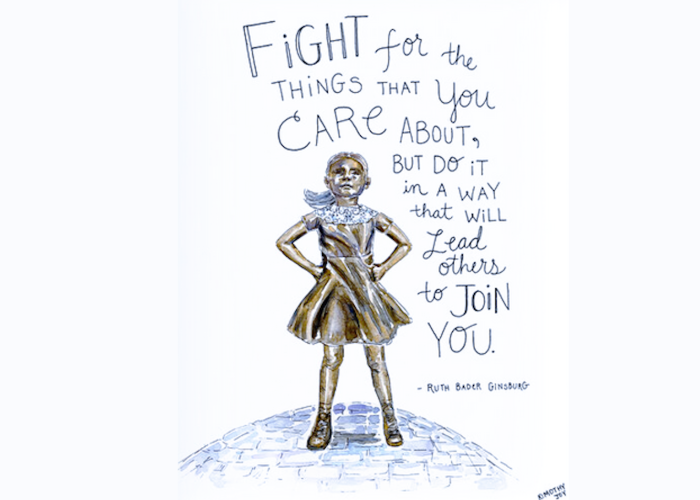
By Olivia Kim
[Editor’s Note: Of the many shocks to the system we’ve endured in 2020, one of the most wrenching was the passing in September of Supreme Court Justice Ruth Bader Ginsburg, aka the Notorious RBG. An icon for the ages, she left her indelible mark on history by seemingly single-handedly moving our society toward equality. Born of the Greatest Generation, she remains a role model to all who have followed, including our multigenerational team at GingerBread Capital. We’re Boomers, Gen Xers, Millennials, and Gen Z’s working at this point in history where, as RBG herself said, few if any doors are left for women to pry open.
With the first woman VP-elect, Kamala Harris, now heading to the White House, it certainly seems so. Yet, we know:
In the fight for equality for all women, there is no rest.
Olivia Kim (the Millennial on GBC’s investment team), who was born just a few years after RBG was appointed to the Supreme Court, claims RBG as one of her Super Heroines. Olivia’s watched the documentary on her life, “RBG,” four times so far. “Every time I cry,” she says.
Olivia recently shared her favorite RBG quotes with us and offered up her thoughts about RBG’s legacy, the impact she’s made on young women, and what we can never take for granted.
(Many thanks to artist Kimothy Joy for sharing her illustration with us. To purchase prints, visit www.kimothyjoy.com)
**
“I’m sometimes asked, ‘When will there be enough (women on the Supreme Court)?’ and my answer is: ‘When there are nine.’ People are shocked. But there’s been nine men, and nobody’s ever raised a question about that.” – RBG
Olivia: RBG single-handedly changed life for American women. She laid the groundwork for us to continue her work by making legal changes to put men and women on the same footing in the eyes of the law. Her work was necessary in order for cultural change to happen.
One of the legacies RBG’s given us is the realization that when the Constitution was written, “we the people” did not include everyone, and each of us must continue to fight to expand the group of people who are, legally and in practice, protected by the Constitution, to include all Americans.
“Young women today have a great advantage, and it is that there are no more closed doors. That was basically what the ’70s was all about. Opening doors that had been closed to women.” – RBG
Olivia: RBG opened so many doors for women, as well as men, by fighting for equal protection under the law. I wouldn’t say that there are no more closed doors to women. Doors are now much more open legally. But they are more open or less open depending on who you are. For example, if a door is an initial entry to a certain professional industry, then the door is open to applying to entry-level jobs. But what about the doors to promotions and senior positions?
I don’t try to speak for all women of my generation, but I know I’m very impatient with the pace of change, so sometimes I take for granted all of the progress that has been made by women of previous generations. Taking time to reflect on, and marvel at, how far we’ve come as women, I realize that lasting change is possible; but it is usually incremental.
There are many social, cultural and economic barriers and disincentives that still exist for women — women in the workplace, women of color, mothers. As a young woman in the early stages of my career, in what have been historically male dominated industries, I feel that I still need to prove that women can be as good at the job and that there can be more women in that role. But what if that particular job isn’t going to turn out to be the best fit? That happens all the time in anyone’s career path. And so it is an enormous pressure and burden that women and people of color particularly feel. We are too often the anomaly and perceived as representing a whole group, and if we don’t succeed in a certain role, then our individual “failure” becomes an indictment against a whole group of people.
“You can’t have it all, all at once. Who — man or woman — has it all, all at once? Over my lifespan, I think I have had it all. But in different periods of time, things were rough. And if you have a caring life partner, you help the other person when that person needs it.” – RBG
Olivia: I take so much for granted. Simple things, like being able to open a credit card or bank account without needing a man as a co-signer. Yet, while laws might have changed, the structures and culture haven’t changed as much as they need to. That’s what we continue to need to work on. Before 1978, for instance, employers could fire a female employee if she got pregnant. RBG laid the legal groundwork that made it illegal [under the Pregnancy Discrimination Act].
Now, employers technically can’t fire women for being pregnant; but there are still many ways women who choose to become mothers are discouraged and penalized in the workplace. I recall at a previous job, a more senior woman left to have a baby and took three months of family leave, and some of my male peers thought it was a no-brainer that she would get a lower bonus because she took that time off, whereas they didn’t. It didn’t occur to them that they would never have to make that choice, that the system gave them a built-in advantage.
At my age, I think “having it all” seems to always be on the line, even though I’m increasingly aware that it’s not possible, at least under the current systems and norms.
“I did see myself as kind of a kindergarten teacher in those days, because the judges didn’t think sex-discrimination existed. One of the things I tried to plant in their minds was, ‘Think about how you would like the world to be for your daughters and granddaughters.’” – RBG
Olivia: Having to teach the men in my life what it’s like to be a woman is a daily annoyance! Yet RBG took that on for her whole life’s career. Like a kindergarten teacher, she educated the men of the Supreme Court, and an entire nation, about what gender discrimination is and why it’s detrimental to both men and women. I think about my grandmother, who is 94 and also a total badass. She was an OB/GYN, made more money than my grandpa. Like RBG, She wasn’t emotional, she didn’t get angry, she just went about doing her job to the best of her ability. Women of that generation who wanted careers were going up against so much that they couldn’t afford to get emotional or angry. However, women of that generation having careers changed society just by doing what they did every day, and paved the way for women after them. We can afford to bring a little bit more emotion and of our whole selves to our work.
“Fight for the things that you care about, but do it in a way that will lead others to join you.” – RBG
Olivia: Part of RBG’s legacy is showing how to get people on your side. How do we get more men on our side? RBG wasn’t a woman who attended the rallies or protest marches of the Sixties and Seventies feminist movement. Her talent, her skill, was her legal expertise.
We have to come together and use our individual talents and skills to change our culture, to address sexism and racism, and social injustices in our lives and the world.
I graduated college the year Trump got elected, and I was in my first job when the #MeToo movement launched. I might not have wound up doing this work now had those two events not happened. I’m channeling my indignation and anger and using that energy in my work.
I really believe in GingerBread Capital’s mission, supporting women founders. Because women with capital can change the world and shift cultural norms. We’re funding incredible and ambitious female founders building innovative companies with hopes they become wildly successful and invest themselves and their money back into other women.
That excites me more than anything. It’s a direct result of RBG’s legacy that we are doing this work, and that’s going to continue to be my North Star.
***
